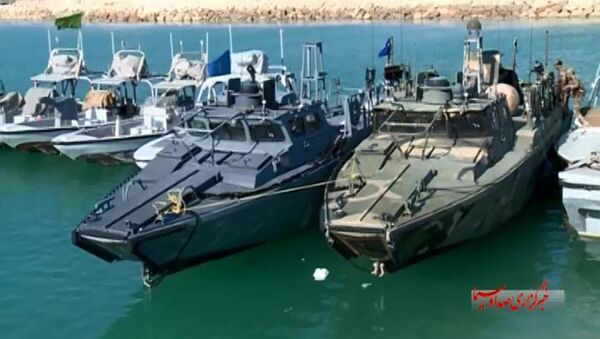On Tuesday, two small US Navy boats drifted into Iranian territorial waters near Farsi Island in the Persian Gulf. US military officials initially blamed the incident on a mechanical malfunction, but have since recanted that explanation.
Tehran has released video footage of the incident, which shows Iran’s Revolutionary Guard boarding the vessels before taking both the boats and the ten crewmembers into custody.
— Sobhan Hassanvand (@Hassanvand) January 13, 2016
The US sailors were taken to a nearby base where they were fed and housed. On Wednesday morning, Iran released the crewmembers, who were picked up by Navy aircraft.
"After determining that their entry into Iran’s territorial waters was not intentional and their apology, the detained American sailors were released in international waters," reads a statement posted online by the Revolutionary Guard.
But General Ali Fadavi, a Guard navy chief, added that the US boats had conducted "unprofessional acts" for 40 minutes prior to their capture, and that he did not consider the boats’ movements an "innocent passage," according to the Blaze.
— Sobhan Hassanvand (@Hassanvand) January 13, 2016
Speaking to CBS, US Vice President Joe Biden denied that an apology had been made.
"There’s nothing to apologize for," Biden said. "When you have a problem with the boat you apologize the boat had a problem? No, and there was no looking for any apology. This was just standard nautical practice."
The swift resolution of the incident has relieved many who were worried that the capture of ten American sailors could spiral into an international standoff. In 2007, 15 British sailors were arrested after entering Iranian waters and held for 13 days.
— Sobhan Hassanvand (@Hassanvand) January 13, 2016
Speaking at the National Defense University in Washington on Wednesday, US Secretary of State John Kerry pointed to a renewed cooperation between Tehran and the West following the nuclear deal agreed to by Iran and the P5+1 nations last year.
"These are always situations that as everybody knows, if not properly handled, can get out of control," Kerry told reporters. "We can all imagine how a similar situation might have played out three or four years ago."
— Sobhan Hassanvand (@Hassanvand) January 13, 2016
Kerry was in constant contact with Iranian counterpart Mohammad Javad Zarif, with whom he formed a close relationship during the nuclear negotiations.
"The top leadership of the Islamic Republic of Iran is not looking for any tension with America," Nader Karimi Joni, a former member of the Revolutionary Guards, told the New York Times. "Both sides, America and Iran, are in direct contact and they seek détente. Currently there is no need for anti-Americanism."


